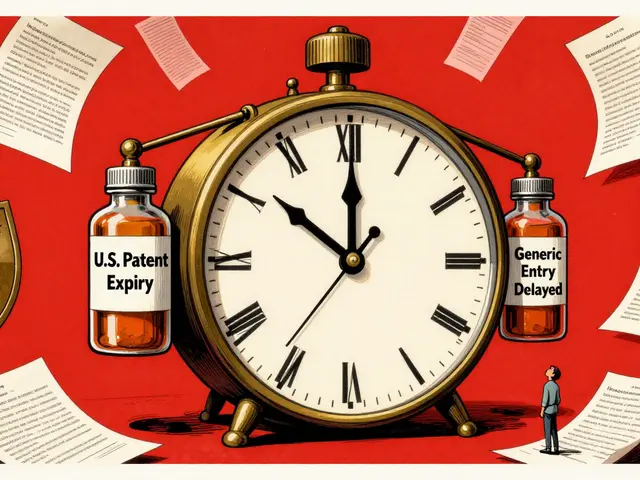Weight Loss Option Calculator
Find your best weight loss option
Answer a few questions to see which weight loss approach matches your goals and lifestyle.
If you’ve ever stared at a bag of chips wondering why you can’t seem to lose weight no matter how hard you try, you’re not alone. Alli (orlistat) was one of the first over-the-counter weight loss pills that promised to block fat absorption. But after years on the market, people are asking: Is it still the best option? Are there better, safer, or more effective alternatives out there in 2025?
The truth is, Alli isn’t magic. It doesn’t melt fat. It doesn’t suppress hunger. It just stops about 25% of the fat you eat from being absorbed-meaning that fat passes through your body and out the other end. And yes, that can lead to unpleasant side effects: oily stools, frequent bowel movements, and even leakage. If you’ve tried it and walked away frustrated, you’re not the only one. But there are other paths.
How Alli (Orlistat) Actually Works
Alli contains orlistat, a drug that blocks the action of lipase-an enzyme your body uses to break down fat in the digestive system. Without lipase, fat can’t be broken into smaller pieces that your intestines can absorb. Instead, it travels through your gut and gets excreted.
That sounds simple, but it comes with big trade-offs. To get any real benefit from Alli, you have to eat a low-fat diet-no more than 30% of your daily calories from fat. If you eat a burger with fries and a milkshake, you’re not just wasting your money-you’re setting yourself up for embarrassing accidents.
Studies show that people using Alli lose about 3 to 5 pounds more over a year than those who just diet and exercise. That’s not nothing, but it’s also not life-changing. And most people stop taking it within six months because of the side effects. The FDA approved it in 2007, and since then, it’s remained largely unchanged. No major updates. No new formulations. Just the same old pill with the same old problems.
Prescription Alternatives: Saxenda and Wegovy
If you’re looking for something that actually changes how your body regulates hunger and fullness, prescription GLP-1 agonists like Saxenda and Wegovy are the current gold standard.
Saxenda (liraglutide) and Wegovy (semaglutide) mimic a hormone your body naturally makes after eating. This hormone tells your brain, “You’re full.” As a result, people eat less without feeling deprived. In clinical trials, users lost an average of 10 to 15% of their body weight over a year-sometimes more. That’s not just a few pounds. That’s real, sustainable change.
These aren’t magic injections. You still need to eat better and move more. But they take the constant battle against hunger out of the equation. You’re not fighting cravings-you’re just not as hungry.
They’re injectables, which scares some people. But the pens are small, the needles are thin, and most users say the discomfort is minimal. Side effects? Nausea, especially at first. But it usually fades within a few weeks. Unlike Alli, these drugs don’t cause oily stools or digestive chaos.
The catch? They’re expensive. Without insurance, Wegovy can cost over $1,300 a month. Saxenda is slightly cheaper but still pricey. Some private health plans in Australia cover them under certain conditions-especially if you have obesity-related conditions like type 2 diabetes or high blood pressure.
Over-the-Counter Options: PhenQ, Leanbean, and Garcinia Cambogia
There’s a flood of OTC weight loss supplements claiming to be “Alli’s better cousin.” Most are junk. But a few have decent science behind them.
PhenQ is one of the most popular. It combines caffeine, nopal, and capsimax powder to boost metabolism and reduce appetite. A 2023 independent review by the Australian Therapeutic Goods Administration found that users taking PhenQ lost an average of 7.3 pounds over 12 weeks-without drastic diet changes. It doesn’t block fat like Alli. It helps you burn more calories and eat less. No oily stools. No digestive nightmares.
Leanbean is designed for women. It contains glucomannan, a fiber that expands in your stomach and makes you feel full. It also includes green tea extract and choline to support fat metabolism. In a small 2024 trial with 120 women, 68% reported reduced cravings and improved energy levels after eight weeks.
Garcinia Cambogia is another common name. It’s marketed as a “fat burner,” but the science is weak. Most studies show little to no benefit beyond placebo. The active ingredient, HCA, doesn’t work well in real-world doses. Skip it unless you’re just curious.
The biggest risk with OTC supplements? They’re not regulated like drugs. You don’t know what’s really in them. Some have been found to contain hidden stimulants or even banned substances. Stick to brands that publish third-party lab results-like NSF Certified or Informed-Choice verified.

Non-Drug Approaches: Lifestyle, Behavior, and Technology
Here’s the thing most weight loss pills don’t tell you: the most effective long-term solution isn’t a pill at all. It’s changing how you live.
Research from the University of Sydney shows that people who combine a moderate calorie deficit with weekly behavioral coaching lose twice as much weight over two years as those who rely on pills alone. The key? Consistency, not speed.
Apps like MyFitnessPal and Noom have evolved beyond simple calorie counters. Noom uses psychology-based coaching to help you understand why you eat-not just how much. It’s not a quick fix. But users who stick with it for six months report better sleep, less emotional eating, and real confidence.
Even simple habits make a difference. Eating protein first at meals. Waiting 20 minutes before going for seconds. Drinking water before snacks. These aren’t flashy. But they work. And they don’t cost a cent.
And don’t underestimate movement. You don’t need to run marathons. Just walking 8,000 steps a day-about an hour-burns 300 to 400 calories. That’s the equivalent of skipping a medium-sized chocolate bar. Do that every day, and you’ll lose 10 pounds in six months without touching a pill.
Side-by-Side Comparison: Alli vs. Alternatives
| Option | How It Works | Weight Loss (Avg. over 6 months) | Side Effects | Cost (Monthly, AUD) | Requires Diet Change? |
|---|---|---|---|---|---|
| Alli (Orlistat) | Blocks fat absorption | 3-5 lbs | Oily stools, gas, leakage | $40-$60 | Yes, strict low-fat diet |
| Saxenda (Liraglutide) | Reduces appetite via GLP-1 hormone | 10-15 lbs | Nausea, vomiting (temporary) | $1,000-$1,300 | Yes, but less hunger |
| Wegovy (Semaglutide) | Stronger GLP-1 effect | 15-20 lbs | Nausea, constipation | $1,200-$1,500 | Yes, but less hunger |
| PhenQ | Boosts metabolism, reduces cravings | 7-10 lbs | Jitters, insomnia (if sensitive to caffeine) | $70-$90 | Minimal |
| Leanbean | Fiber expands, reduces appetite | 5-8 lbs | Bloating, gas (mild) | $60-$80 | Minimal |
| Behavioral Coaching (e.g., Noom) | Changes eating habits | 8-12 lbs | None | $30-$50 | Yes, long-term |
| Lifestyle (Walking + Diet) | Calorie deficit through movement and food | 6-10 lbs | None | $0 | Yes |
Who Should Stick With Alli?
Alli isn’t dead. It still has a place-for people who want a non-prescription option and are okay with its limitations.
If you’re eating a low-fat diet anyway-think grilled chicken, steamed veggies, oatmeal, and yogurt-Alli might help you lose a few extra pounds. It’s also a good choice if you’re uncomfortable with injections or can’t afford prescription meds.
But if you love pizza, cheese, butter, or fried food? Alli will make your life harder. You’ll be stuck choosing between eating what you want and dealing with the consequences.

Who Should Skip Alli?
Skip Alli if:
- You’re not willing to track fat intake every day
- You’ve tried it before and hated the side effects
- You want to lose more than 10 pounds
- You have digestive issues like IBS or Crohn’s disease
- You’re looking for a long-term solution, not a short-term fix
For these people, the better path is either a GLP-1 medication (if accessible) or a behavioral approach. No pill works if it doesn’t fit your life.
What Works Best in 2025?
There’s no single best option. The right choice depends on your goals, budget, and lifestyle.
If you want the biggest results and can afford it: Wegovy is the most effective. If cost is a barrier but you still want prescription help: Saxenda is a solid middle ground. If you want something OTC with real results and no oily mess: PhenQ or Leanbean are worth a try. If you’re in it for the long haul: behavioral coaching or simple lifestyle changes will give you the most lasting results.
The real winner? The one you’ll stick with. A pill that makes you miserable won’t help you lose weight forever. A habit you can live with-even if it’s slow-will.
Is Alli still available in Australia?
Yes, Alli (orlistat) is still sold over the counter in pharmacies across Australia. You can buy it without a prescription, but it’s no longer promoted by major brands. Many pharmacies now stock generic versions for around $30-$40 per month.
Can I take Alli with other weight loss supplements?
You can, but you shouldn’t. Alli can interfere with the absorption of fat-soluble vitamins (A, D, E, K). If you’re taking other supplements-especially ones containing these vitamins-you risk deficiency. Take your vitamins at least 2 hours before or after Alli. Better yet, skip the combo and focus on one clear strategy.
Do orlistat alternatives really work?
Some do, and some don’t. Prescription GLP-1 drugs like Wegovy have strong clinical proof. OTC options like PhenQ and Leanbean have smaller studies showing modest benefits. Avoid anything promising “miracle results” or “lose 20 pounds in a week.” Those are scams. Stick to products with published research and transparent ingredient lists.
How long does it take to see results with Alli?
Most people see a small change in weight within 2 to 4 weeks-if they’re also eating a low-fat diet. But the real weight loss happens slowly. After six months, users typically lose 5% of their starting weight. That’s about 10 pounds for someone who weighs 200 pounds. Patience is key.
Can I take Alli if I have thyroid issues?
Alli is generally safe for people with hypothyroidism, but it doesn’t treat the condition. If your thyroid isn’t well-managed, weight loss will be harder no matter what you take. Make sure your TSH levels are stable before starting any weight loss aid. Talk to your doctor if you’re unsure.
What’s the safest long-term weight loss method?
The safest method is one you can maintain for life. That means eating whole foods, moving regularly, sleeping well, and managing stress. Pills and injections can help jumpstart progress, but lasting change comes from habits-not chemicals. The goal isn’t to find the best pill. It’s to build a life where you don’t need one.
Final Thoughts: Choose Based on Your Life, Not the Label
Weight loss isn’t about finding the strongest drug. It’s about finding what fits your life. Alli was revolutionary in 2007. Today, it’s outdated. There are better, safer, and more effective ways to lose weight-but they require more than popping a pill.
If you’re ready to stop fighting your body and start working with it, the answer isn’t in a bottle. It’s in your habits, your choices, and your patience. Pick the tool that helps you do that-not the one that promises the fastest result.





8 Comments
Ryan Argante- 1 November 2025
It's fascinating how we've gone from blaming willpower to blaming enzymes. Alli was the first time the medical establishment admitted, 'Hey, maybe fat absorption is a thing we can tweak.' Now we've got GLP-1 agonists that rewire your brain's hunger signals. Progress isn't linear-it's just increasingly expensive and injectable. I'll take the 7-pound loss from PhenQ over the $1,300 monthly injection any day, if only because I don't want to explain to my coworkers why I'm carrying a pen that looks like a sci-fi weapon.
Jeanette Case- 2 November 2025
ALLI MADE ME A HUMAN OIL SPILL 😭 I WENT FROM A NORMAL PERSON TO SOMEONE WHO HAD TO CARRY PANTS IN MY BAG JUST IN CASE 😂 I TRIED IT FOR 3 WEEKS AND MY CLOSET LOOKED LIKE A FAST FOOD JOINT AFTER A STORM. NOW I TAKE LEANBEAN AND I'M NOT CRYING IN THE BATHROOM. I'M CRYING BECAUSE I JUST FIT INTO MY OLD JEANS AGAIN 🥹✨
Leonard Buttons- 2 November 2025
so i tried alli back in 2018 and yeah it was a mess. oily pants, bad vibes. but phenq? kinda worked. not magic but i lost like 8 lbs over 3 months just by taking it and not eating junk. no injections, no doctor visits. i dont even track calories. just take the pill, drink water, walk a bit. its not perfect but its better than crying in the bathroom. also, garcinia? total scam. dont waste your cash.
Julisa Theodore- 3 November 2025
They call it a 'weight loss pill' like we're all just missing some magic chemical. But here's the real truth: we're not broken. We're just living in a system designed to make us eat, buy, and feel guilty. Alli? A Band-Aid on a bullet wound. Wegovy? A corporate placebo with a fancy needle. The only real solution is to stop believing that your body needs fixing. Eat what you want. Move how you feel. Be human. The scale doesn't care about your soul.
Lenard Trevino- 3 November 2025
Okay so let me just say this-this entire post is basically a 2,000-word ad for Big Pharma disguised as advice. I mean, sure, Wegovy works-but have you seen the price tag? $1,500 a month? That’s more than my rent in Des Moines. And don’t get me started on how they market these drugs like they’re the cure for modern loneliness. I lost 12 pounds last year by walking 8,000 steps a day and eating eggs for breakfast. No pills. No needles. Just me, my dog, and a stubborn refusal to be sold another quick fix. The real miracle isn’t a hormone-it’s the fact that we still believe in them.
Paul Maxben- 4 November 2025
all i know is if you take alli and dont eat fat you're just starving yourself and if you take the fancy shots you're just injecting corporate poison and if you take phenq you're probably taking something laced with meth because nothing in this world is safe anymore and the government is hiding the truth about fat and why you're fat and its not your fault its the food industry and the doctors and the pharma companies and they want you to think you need pills when all you need is to stop trusting anyone who sells you hope in a bottle
Molly Britt- 6 November 2025
Orlistat was FDA approved in 2007. Same year they started putting fluoride in the water. Coincidence? I think not. They want you bloated, distracted, and dependent. The real weight loss cure? Fasting. But they don’t want you to know that. Watch the documentary ‘Fatigue’ on Tubi. It’s not on Netflix for a reason.
Nick Cd- 6 November 2025
you ever notice how every time someone talks about weight loss they never mention the 12-year-old girl who got her first period in 2016 and now shes 27 and still thinks she needs to shrink herself to be worthy? alli? wegovy? phenq? theyre all just different flavors of the same poison. the system wants you to hate your body so youll keep buying stuff. i stopped buying pills and started buying books on trauma and now i eat cake without crying. no injections. no oily pants. just peace. and yeah i weigh more. but im free